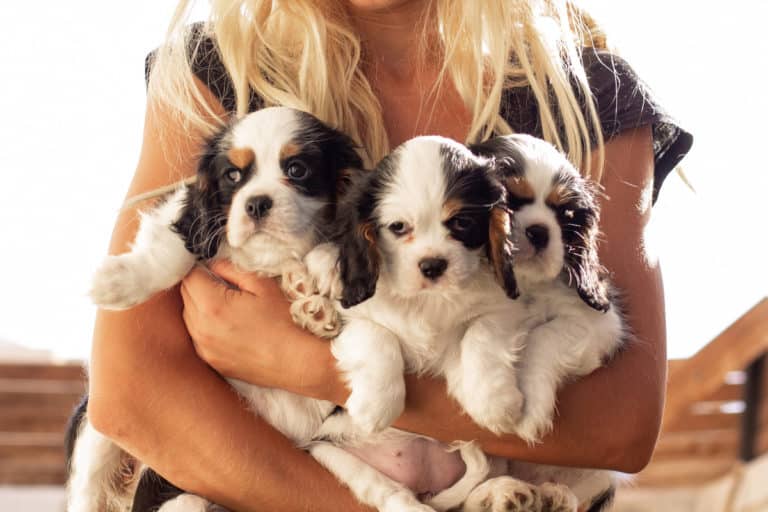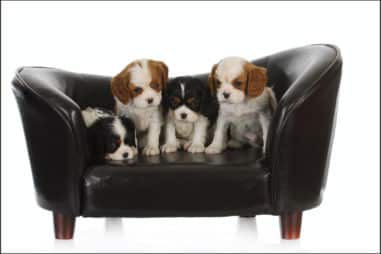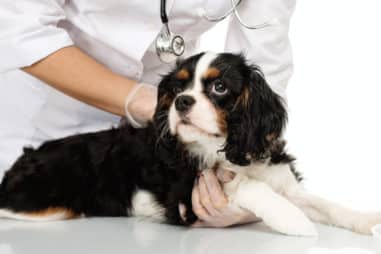The regal Cavalier King Charles Spaniel also comes in a price tag fit for royalty. Even if they are not the most expensive dogs, they make it on the list.
As a breed riddled with inherited medical conditions, you should not buy them for a cheap price. Reputable breeders will do some tests for their puppies for health documentation. They are not cheap, and this will reflect in their price. Although buying from these breeders is expensive, this may save you money in the long run.
Cheaper Cavaliers are often unhealthy, so you will shell out more for vet bills. These are only some of the reasons that justify the Cavalier’s high price tag. If you want to know the other reasons for this, you will find them below.
Are Cavalier King Charles Spaniels Expensive?
Although not the most expensive, Cavaliers are still a pricey dog breed to buy. The initial cost can be a lot, buying the puppy and its supplies. You also have to consider the monthly costs for your Cavalier, like their food.
The good thing is that other costs, like their toys, can be less expensive in the long run. Cavaliers are usually not destructive with their toys.
You also need to consider their vet costs. This can be expensive when they are puppies since they need their vaccines and other exams. But you will be paying less on their regular checkups once they are through with this.
Pet insurance is not an option for Cavaliers, it is a need. Cavaliers have several genetically inherited disorders. And without insurance, treatment costs for these can skyrocket.
How Much Does a Cavalier King Charles Spaniel Cost?
A Cavalier’s cute, floppy ears come with a price, costing you from around $1,500 to $3,500. The price depends mainly on where you buy your Cavalier. A reputable breeder with healthy and high-quality Cavaliers will charge you more.
While expensive, it is best to buy from these breeders. Most of them do screening tests for their puppies to check for any possible health issues. Usually, they are also happy to give you a puppy’s health certificate.
With a cheaper Cavalier, you are more at risk of buying a Cavalier who has health issues. Yes, the initial cost can save you money. But the medical expenses you need to pay for in the long run are pricey.
How Much Do Cavalier King Charles Spaniels Cost in UK?
The cost of a Cavalier pup in the UK is from about £2,500 to £4,000. Again, although buying from a reputable breeder is more expensive, it is still better. With this, you are reducing the risk of buying a poorly bred Cavalier puppy.
How Much Is a Full-Breed Cavalier King Charles Spaniel?
Buying a full-breed Cavalier starts at around $1,500 but can go as high as $14,000. With a lavish price for such a regal breed, Cavaliers are one of the priciest dog breeds you can buy.
How Much Are Cavalier King Charles Spaniel Puppies?
You can get a quality Cavalier puppy for around $1,500. But this price can go higher, at around $3,000. They are not the most expensive pups, still, they make it on the list of the priciest ones.
Why Are Cavalier King Charles Spaniel So Expensive?
There are three main reasons for a Cavalier King Charles Spaniel’s high price tag. They have a small litter, they have high demand, and they are hard to breed. If you are wondering why these matter, you will find explanations below.
They Have Small Litters
The litter sizes of Cavaliers range from 2 to 6 puppies. But some have less than that, like first-time Cavalier moms. They only produce around 2 to 3 puppies.
They Are in Demand
Since 2013, Cavaliers have been in the top 20 most popular dog breeds by AKC. For a relatively new breed, this is a great feat. Unfortunately, some breeders have a hard time keeping up with the demand.
They Are Hard to Breed
As a breed riddled with genetic disorders, Cavaliers are difficult to breed. Reputable breeders take more time and use more money to produce healthy puppies. All this time and cash will reflect on their price tag.
Combining These Factors
Factoring all these, it is easy to see why Cavaliers are expensive to buy.
First, there is a lot involved in breeding them. Apart from prenatal and postnatal care, breeders need to spend on screening tests. This is to check for any genetically inherited diseases Cavaliers often have.
These tests are expensive. So breeders have to make up for their money selling their puppies.
But the thing is, Cavaliers often have small litters. They will get their money back if they sell puppies at a low price. Many only make a small profit or only break even.
This small litter size is also a problem for their demand. In 2021, Cavaliers peaked in the top 15 for the most popular dog breeds list by the AKC. With a low supply and a high demand, the price will increase.
Where Can I Find a Cavalier King Charles Spaniel?
You can get Cavaliers from breeders or your local animal shelter. It may be hard to find a Cavalier from the latter, so you can go to a breed-specific rescue shelter instead.
Where to Adopt Cavalier King Charles Spaniel
There may be Cavaliers who are looking for a home in your local shelter. You can also look for Cavaliers online, like Pet Finder and Adopt a Pet. But it is rare to find Cavaliers here, so there is another option you can try.
You can adopt Cavaliers from shelters that are specific to this breed. Some of these organizations are Cavalier Rescue USA and The Cavalier Rescue. You can choose from many others, depending on which one is closest to you.
How Much Does It Cost to Adopt a Cavalier King Charles Spaniel?
Adopting a Cavalier will cost you significantly less, at around $50 to $300. The price may vary where you live, but is nowhere near the cost of buying from breeders.
Rescue Cavaliers can also help you save on vet bills. They are usually fully vaccinated. Also, some are already neutered or spayed.
Keep in mind that most Cavaliers you can get are adults if you choose this option. So if you want to get one as a puppy, your best bet is to buy from a breeder.
What Should I Look for When Buying a Cavalier King Charles Spaniel?
When buying a Cavalier, the main things you check for are their health and their breeder. That is if you are already sure that Cavaliers are a good fit for you and your lifestyle.
Buying a dog is a big decision, so cover your bases. You can do this with the following:
- Spending Time With the Puppy
- Observing the Puppy
- Meeting the Puppy’s Parents
- Asking the Breeder Questions
- Checking Their Health Documents
A lot goes into each of these, so below is a more detailed read on each.
Spend Time With the Puppy
The first things that you should check are their eyes and ears. These two areas are not the cleanest part of a Cavalier and are prone to issues. So these should be clean and have no discharge, including their nose.
Check for their coat, too, and make sure they do not have any fleas or other parasites. While you are at it, check if they have worms. You can tell if they do if the puppy has a round belly and prominent ribs.
Although you can treat worms, this will give you an idea of how the breeder cared for them. A potbellied pup can mean that the breeder did not take care of them very well.
Spending time with them also gives you an idea of their personality and temperament. Cavaliers love people, so the puppy should not be overly scared of you. They should be energetic and nonaggressive. Registry guidelines should give you a good idea of what to watch out for personality-wise.
Stay away from lethargic puppies, as it can be a sign of a less than ideal upbringing. This can lead to behavioral problems down the road.
Keep in mind that Cavalier puppies need a lot of sleep. So if you find that the puppy is a little dozy, that is nothing to worry about.
If you are looking for a show-dog Cavalier, you also need to check if they fit the breed standards. You can find detailed descriptions of the breed on the website of registries. This is an important step to take. Registries are strict on a show dog’s appearance.
An example is that ruby or black and tan Cavaliers should have no white markings. These are faults in the eyes of the AKC. They will also heavily penalize any Cavalier whose coats have been trimmed.
Observe the Puppy
This is also a good way to check for their temperament. See how the puppy interacts with its littermates and other animals.
This is a must for show-dog Cavaliers. The AKC eliminates Cavaliers from the competition if they are:
- Bad-Tempered
- Shy
- Mean
Even if you do not plan on getting a show dog, these are characteristics you would not want in a pet. Instead, a Cavalier’s temperament should be:
- Outgoing
- Nonaggressive
- Calm
- Confident
So if the puppy is keen on joining its brothers and sisters for playtime, this is a good sign. You should not see them shy away in a corner to avoid interactions.
Meet the Puppy’s Parents
It may not be possible to see both, but you should always ask to see the mother of the puppy. This will help you with three things:
- The Puppy’s Temperament
- The Health of the Litter and Mother
- Their Environment
Breeders who will hesitate to show you the mother should ring your alarm bells.
The parents will give you an idea of how your puppy behaves later. If they are gentle and nonaggressive, chances are, your puppy will be like this too.
Keep in mind that the mothers may be defensive with their puppies. This is normal, so keep a safe distance as you observe her.
You will also see the health condition of the mother and her puppies. The mother should have proper postnatal care and should be doing well. Otherwise, this is a sign that the breeder is not providing adequate care for her and the litter.
A mother in poor health will mean that her puppies do not get enough milk. This can affect the puppy’s health and immunity, which is something that should concern you.
Meeting the parents will also let you see the environment in which they are being raised. The area should be clean with enough room for everyone. You should also see what the dogs are eating, to make sure they get enough nutrition.
If the area is dirty, worn down, and crowded, this is a good breeding ground for diseases. Puppies in this environment can easily get sick since they still have a weak immune system. This is also not a humane way to raise any dog, so avoid buying from breeders who raise puppies like this.
Ask the Breeder Questions
This is an important step that you should not skip, even if you are talking to a reputable breeder. This goes both ways, a good breeder should also ask questions about you. This will help them know if their puppy will go to a happy and loving home, and if they do this, take it as a good sign.
But what questions should you ask? Below are some examples, but feel free to ask more if you want to.
How Old Is the Puppy?
Good breeders will not sell their puppies below seven weeks of age. At this age, the puppy is not ready to separate from their mothers. Taking them away very young can lead to emotional and physical harm.
A puppy is usually ready for its new home at around seven to eight weeks old. Sometimes, this can also be as late as 12 weeks old.
Is the Puppy Weaned?
Part of preparing them for their new home is making sure that the puppy is weaned. If the puppy still feeds on its mother’s milk, you cannot separate them yet. You should let your breeder show you this to be sure.
How Many Litters Has the Mother Had?
Breeding mothers frequently is very harmful to them. Pregnancy and birthing are stressful enough. So doing this often can result in several medical complications.
Good breeders will limit breeding the mothers to only four times. Some countries also have restrictions on the number of times one can breed a mother. If you want a show-dog Cavalier, registries also have restrictions on this.
Is the Puppy Wormed and Vaccinated?
No matter who the breeder is, puppies will have worms the moment they are born. So breeders should deworm their puppies from two weeks of age. This should continue every two weeks after that.
The breeder should start the puppy’s deworming and you should continue it. The same goes for the puppy’s first shots.
Usually, their first vaccines start from six to nine weeks of age. If your breeder has not done this, the responsibility will fall on you.
How Did You Socialize the Puppies?
The breeder should have taken the appropriate steps in this. Puppies should be familiar with the noises of a household. If you have children and other pets, ask the breeder if the puppies got enough exposure to them as well.
Puppies who lived in a secluded area will have a hard time adjusting to their new homes. Without socialization, they will fear these new experiences.
Is It Possible to Return the Puppy?
Responsible breeders will allow you to return the puppy within a certain period. So have your vet check the puppy right away for any health concerns. If there is, you can take the puppy back.
Sometimes, some people find themselves unable to care for the puppy. In this case, it is better to give the puppy back instead.
What Inherited Medical Conditions Should I Know Of?
Cavaliers have a lot of medical issues dictated by their genetics. With this, always ask for the parent’s medical history. This will give you an idea of what to watch out for in the future.
Knowing these can also help you to take preventative measures for the puppy’s health. Ask your vet about the steps you should take for this. You can also find suitable pet insurance to help you with medical costs.
Check the Puppy’s Health Documents
Since Cavaliers can inherit many health issues, be meticulous about this step. Purebred Cavaliers have a limited gene pool, making this worse.
With this, you should always seek a breeder who does health tests on their puppies. This includes the following:
- Vaccination Certificated
- Deworming History
- All Health Certificate Copies
- DNA Test Certificates
A responsible breeder will also give you the health certificates of their parents. Some will even go as far as giving you the certificates of the puppy’s grandparents.
Cavalier breeders should also do tests for the following:
- Mitral Valve Disease
- Curly Coat/Dry Eye Syndrome Test
- Episodic Falling
- MRI Scanning for Syringomyelia
- Chiari Malformation
- Hip Dysplasia
- Retinal Dysplasia
- Cataracts
- Degenerative Myelopathy
Since mitral valve disease is the number one cause of Cavalier deaths, focus on this more. Syringomyelia is also fatal, but some areas may not have MRI scanning available. So this is where the parents’ health certificates can help.
The breeder should not hesitate to show any documents about the puppy’s health. If they do, this should ring your alarm bells.
Is It Better to Get a Boy or Girl Cavalier King Charles Spaniel?
Depending on what you are looking for, a male or a female Cavalier will suit you better. They have slight differences that you may consider an advantage or a disadvantage. Remember, one is not better than the other and it just depends on you.
Both are equally affected by the health issues that afflict Cavaliers. So this should not be a big factor in choosing their gender.
To help you make this decision, below are the differences in each.
Male Cavalier King Charles Spaniels
Personality
As the more affectionate ones, male Cavaliers are often devoted to one person. They are clingier, following you around the house as you go about your day. You can say that they are textbook lapdogs.
But they are also more likely to escape your home to roam. This happens when an intact male smells a female who is in heat. With this, you should be careful in keeping them indoors.
Male Cavaliers are also more hyper, retaining their puppy-like energy after turning one. This is good for families with children, as they will make great playmates.
It is a bonus that they are protective over whomever they have created a bond with. This is a characteristic that makes them great family dogs.
A downside is that males are more aggressive, but this is not directed towards you. They get aggressive towards other dogs, such as a competitor when there is a female in heat. Or, when a female does not respond to them for mating.
Trainability
It may be more challenging to train a male Cavalier. They are intelligent, but they are hyperactive and easily get distracted.
Another concern is that they are more dominating. So they may assert their dominance over you during training sessions.
But compared to females, males are more eager to please you. So with patience, you will find success in training a male Cavalier.
Female Cavalier King Charles Spaniels
Personality
In general, females are more subdued than their male counterparts, especially in their clinginess. While males latch on to one person, females do not. They tend to give equal attention to all members of the family.
They are content in being in the same room as you, so they are more independent. Sometimes, they want to cuddle you, but other times, they want to be alone. With females, they decide when they want to get your attention.
While they are less aggressive, they are more stubborn than male Cavaliers. So if they are not interested in doing something, they will not budge.
Trainability
Female Cavaliers are calmer and mature quicker. Although they have a stubborn streak, they are generally easier to train than males.
When they do become stubborn during training, do not be hard on them. Their mood can change in a snap, so they become scared and uninterested pretty quickly.







